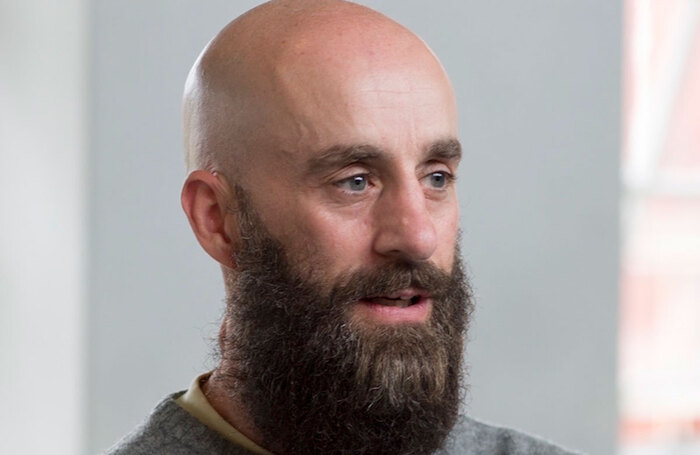
 (4 / 5)
(4 / 5)
There is a sadness and deep sense of injustice behind the humour and surrealism of For the Grace of You Go I. Due to begin just before the pandemic hit, Alan Harris’ play may be long overdue but its delay has proved timely. Beneath the strange veneer of a storyline in which a man puts out a hit on himself lies a sobering analysis of the inequalities that coronavirus has exposed in society over the past 18 months. It makes for a darkly comic play that is both hugely entertaining yet deeply unsettling.

Its colourful set, of luminescent pink, green and yellow walls, belies the broken and struggling lives of its characters. They do reflect the dreaminess of their existence though. Jim (Rhodri Meilir), employed to put pepperoni on pizza as part of a government scheme, imagines himself as Employee of the Month – complete with giant rosette and accomplished chef’s hat – in one of several cartoonish scenes projected onto the walls. In reality, he is a thorn in his line manager Irina’s side. Played by Remy Beasley, she is under constant pressure to meet targets, and Jim’s daydreaming does nothing to help matters. Though work gives him a sense of purpose, she is forced to let him go. His only solace is found in a monthly film club where he meets new guy Mark (Darren Jeffries), whose obsession with American action movies makes him the perfect partner in Jim’s movie-styled life. After watching the 1990 Finnish film I Hired a Contract Killer, Jim decides that he wants to take the place of its protagonist and asks Mark to do the honours in killing him. It may sound rather far-fetched but there is a serious underbelly to its hyperbole and other-worldliness.
Jeffries gives an assured performance as Mark, whose Mancunian swagger hides a far more vulnerable masculine existence. He is terrific opposite Rhodri Meilir, who brings a beautiful innocence to the troubled Jim, their exchanges pacy and lively throughout to give a slightly unnerving edge to the funny and ironic dialogue. Beasley is wonderfully on-edge as the hassled Irina, maintaining a brilliant balance between sanity and breakdown such that her character fizzes both in dialogue and action like a loosely-corked bottle of pop. The pressures on all three are palpable in their different ways; and they give rise to the much bigger issues at play. Harris comments on mental health, consumerism, capitalism and the political system without ever being preachy. He achieves this through the disabling use of humour and by intimately tying the issues to the narrative. As a result, they ooze naturally out to offer a searing indictment on the oppressive systems and privileged attitudes in existence within society, tempered frequently by the comic form.
I had expected to be overwhelmed as I walked through the doors of Theatr Clwyd for the first time in 18 months. But though it felt special to enter the building to a familiarly warm welcome, made more so by the beaming sun as it flooded in through the windows; to give a knowing smile to the recognisable pictures on the stairs up to the Emlyn Williams theatre; and to be greeted by the same ever-delightful staff who were courteous and helpful as I got into a bit of confusion over my ticket number, it was the reminder of the importance of theatre, as a medium that can speak truth to power, that really made its mark. That importance has not gone away over the course of the pandemic. If anything, it has grown stronger and become more vital than ever. But having become acutely aware of this once-unspoken assumption outside of the context of its physical space and place, For the Grace of You Go I was the first opportunity for what had become apparent through the screen to be embodied within the bricks and mortar to which theatre most truly belongs. As such, Alan Harris’ already-powerful message struck an even deeper chord than it might have in pre-Covid times. If it had something to say then, it most definitely needs to be heard now.
Click here to find out more and purchase tickets.
Get the Chance supports volunteer critics like Gareth to access a world of cultural provision. We receive no ongoing, external funding. If you can support our work please donate here thanks.

Gareth Williams



